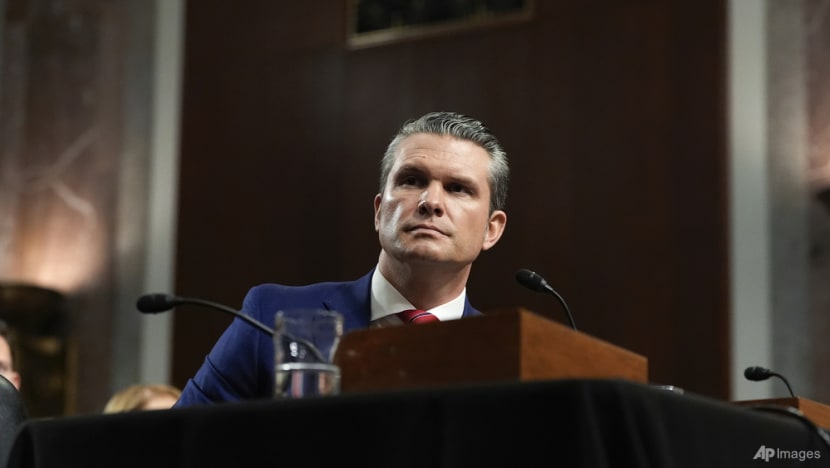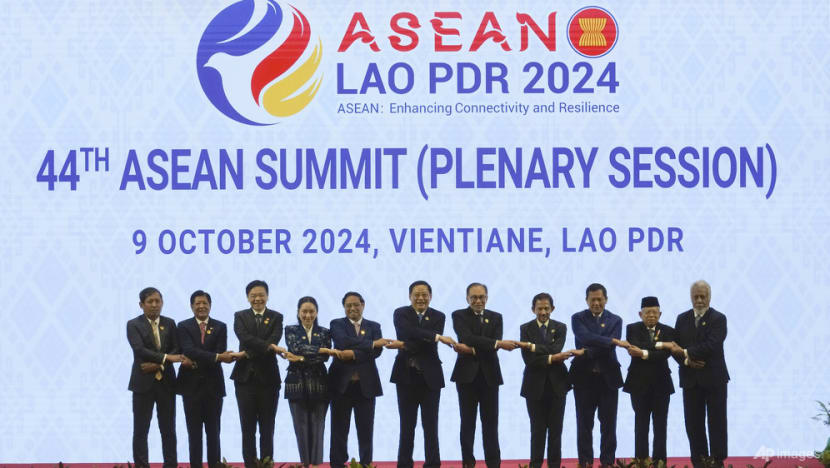Advertisement
Donald Trump did not nominate Pete Hegseth as defence secretary for his knowledge of global affairs, but the lapse highlights two concerns for Southeast Asian countries, says RSIS’ Kevin Chen.

Pete Hegseth, President-elect Donald Trump’s choice to be defence secretary, appears before the Senate Armed Services Committee for his confirmation hearing, at the Capitol in Washington, on Jan 14, 2025. (AP Photo/Alex Brandon)
New: You can now listen to articles. 
This audio is generated by an AI tool.

17 Jan 2025 06:00AM
SINGAPORE: Confirmation hearings for United States political appointees are normally mundane domestic affairs – until a clip from one such hearing went viral halfway around the world in Southeast Asia.
Pete Hegseth, the former Fox News host and military veteran who is President-elect Donald Trump’s choice for defence secretary, was grilled for four-and-a-half hours on Tuesday (Jan 14), which included questions about allegations of sexual assault and excessive drinking. What went viral was his inability to name a single country in the Association of Southeast Asian Nations (ASEAN).
For some Southeast Asian observers, this may be another example of American arrogance and Washington’s overall inability to live up to its lofty claims about the importance of ASEAN in its regional strategy. Yet, one must understand the context and implications of this flub to appreciate what it means for ASEAN’s engagement with the US.
DON’T CALL IT A GAFFE
Consider the two parts of Democratic Senator Tammy Duckworth’s question to Mr Hegseth: First, to “name the importance of at least one of the nations in ASEAN and what type of agreement we have [with them]”; and second, to state how many nations there are in ASEAN.
If Mr Hegseth had only been unable to answer the second question, that might have been a more forgivable lapse of knowledge. The US is a partner to several international groupings, including ASEAN, the European Union, and the South American MERCOSUR. It would be beneficial, but not mandatory, for a defence secretary to keep up to date on their concerns and membership.
The more serious flub was Mr Hegseth’s inability to name a single ASEAN country, even countries with whom the US has a defence alliance that commits it to offer military assistance in a conflict, such as the Philippines and Thailand. Taken together, these two unanswered questions undermine previous claims by Mr Trump’s first administration that ASEAN is the “geographical centre of the Indo-Pacific” for the US.
Was this a gaffe on Mr Hegseth’s part? He was not chosen for the defence secretary position due to his knowledge of global affairs.
By Mr Hegseth’s own admission, his aim is to restore “warrior culture” at the Defence Department as a veteran with “dust on his boots”. During his opening statement, he did not mention China or the Indo-Pacific once, devoting his time to outlining his vision for a more “lethal” military. During his responses, he also said little about how Mr Trump could end the Russia-Ukraine war and manage security issues in the Middle East.
As such, calling this incident a gaffe may not be accurate. A gaffe is a silly mistake, something accidental and suggesting that the party involved should know better. In this case, Mr Hegseth was performing exactly as intended, but flubbed a question that he did not know the answer to.
If observers wanted an informed picture of US foreign policy, they should have watched Senator Marco Rubio’s confirmation hearing for secretary of state instead.
BILATERAL PARTNERS OR ASEAN MEMBER STATES
Even so, Mr Hegseth’s lapse has brought at least two concerns about US-ASEAN relations to the fore: That the US will increasingly prioritise bilateral ties over ASEAN ties, and that it will compartmentalise defence and economic ties in its approach to the region.
For one, it’s not just about how often the US fails to live up to its rhetoric about working with the bloc. President Joe Biden’s absence from consecutive ASEAN Summits and the creation of smaller minilateral groupings such as the Australia-UK-US trilateral security partnership (AUKUS) showed his preference for working around the grouping.
When he did engage with ASEAN countries, it was contingent on their ability to reciprocate, such as the Philippines agreeing to more Enhanced Defense Cooperation Agreement (EDCA) sites to station more American troops and equipment near the potential flashpoints in the South China Sea and Taiwan Strait.

The bigger concern is what the region loses without its collective advantage. Mr Trump’s disdain for multilateral organisations is well known, as is his preference for bilateral engagement to make full use of the US’ economic and military leverage.
In fact, Mr Hegseth’s ASEAN flub may be due to him conceiving of countries such as the Philippines as treaty allies instead of ASEAN member states, though this would be little consolation for regional observers.
A second concern would be how US officials are ostensibly separating defence and economic ties, which would exacerbate existing imbalances in US engagement. On one hand, US strategic documents such as the 2019 Free and Open Indo-Pacific Strategy highlight the important role of economic development in achieving regional stability and security.
Yet, this recognition is not supported by US policy. Ever since the US withdrawal from the Trans-Pacific Partnership (TPP), a common criticism of US engagement is that it is too focused on security to the detriment of economics and trade. Given how Mr Hegseth’s supporters dismissed ASEAN as a political-economic union that a defence secretary should not need to worry about, it is unlikely this imbalance will be addressed in the near future.
ASEAN MUST PERSIST AND ENSURE ITS RELEVANCE
Despite this flub, Mr Hegseth appears on track to being confirmed, with Republican senators who previously questioned his appointment shifting to support him.
Nonetheless, ASEAN leaders should not be discouraged. There will be plenty of opportunities to engage Mr Hegseth and explain the nuances of the region to him, including the annual Shangri-La Dialogue in Singapore from May 30 to Jun 1 this year.
For their part, ASEAN leaders must clearly communicate their positions on key security issues to ensure the grouping’s continued centrality. They must make ASEAN harder to bypass or ignore.
Kevin Chen is an Associate Research Fellow with the US Programme at the S Rajaratnam School of International Studies (RSIS), Nanyang Technological University (NTU), Singapore.
